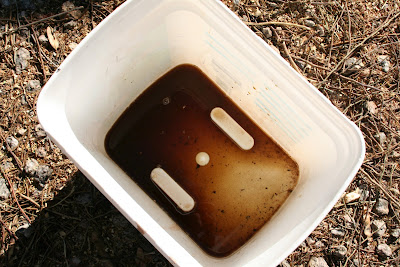 |
| A small amount of compost tea in the bottom of a bucket. At its simplest, compost tea is simply the liquid drained out of compost and used as a sort of fertilizer. |
Compost teas seem to be one of the latest things in organic gardening. At their simplest compost teas are the liquid drained out of compost and used as a plant fertilizer. There are many benefits to using compost teas which include delivering nutrients and beneficial microbes to plant leaves and roots. The beneficial microbes can protect the plants from pests and produce healthy living soils. There are potentially hundreds of different ways to make compost teas.
The most basic:
1. Drain liquid out of compost
2. Dilute liquid in water
3. Apply to plants by spraying on foliage and soil
I have used the above basic compost tea many times and it has been extremely effective. Plants will often respond to it almost as fast as they would to chemical fertilizers and the benefits generally last longer then chemical fertilizers.
Another common type of compost tea:
1. Place compost filled burlap sack in a bucket of water.
2. Oxygenate the water by adding fish bubblers to the bucket or by swishing around the burlap sack every few hours.
3. Continue to do this anywhere from a few hours to a few days.
4. Remove burlap sack and apply tea to foliage and soil
There are many variations of the above. One of the more common ones involves adding a few tablespoons of black strap molasses to the bucket of water. The molasses adds nutrients to the tea and aids the growth of beneficial organisms. Though I have never tested this, compost tea made with molasses apparently is a strong deterrent to ants. My latest batch of compost tea involved soaking compost in water for several hours and adding Mycogrow, which is a concoction of fungal spores. Fungal spores are like seeds for fungus. The Mycogrow spores are for mycorrhizal fungi that infect plant roots, aiding water and nutrient uptake, thus benefiting the infected plant. I'll report back on this if I find something interesting, I have several fungal blog posts in the works.
 |
| Bag of Mycogrow spores from Fungi Perfecti. I mixed this bag of fungal spores with some compost tea a few weeks ago and applied them to my garden. |
For more information check out these articles:
No comments:
Post a Comment